
Jewish Ideas to Change the World
Valley Beit Midrash
Jewish Ideas to Change the World delivers thought-provoking content by leading Jewish thinkers with diverse perspectives and backgrounds.
- 1 hour 5 minutesIs God Dead?
A virtual event presentation by Dr. Elias Sacks
About The Event:Ever since the nineteenth century, it has been common for thinkers to declare that “God is dead”—that it no longer makes sense to believe in a deity (and perhaps never did). However, even as critiques of belief in God have become increasingly prevalent, a wide range of thinkers have challenged this perspective, arguing not only that there are good reasons to believe in God, but also that this type of belief is more important now than ever before. In this session, we will explore these issues, wrestling with diverse Jewish responses to questions such as: Does it make sense to believe in God? Does Judaism require that we believe in some type of deity, or are Judaism and atheism compatible? And what difference—if any—should believing (or not believing) in God make for how we think about ethics, politics, and the decisions we make about how to lead our lives?
*Source Sheet: https://docs.google.com/document/d/1lpgn2HUAC--4s-gdQuR_MvVUYp5LcN83p4NUap1K-tI/edit?tab=t.0
About The Speaker:Elias Sacks is an Associate Professor of Religious Studies and Jewish Studies at the University of Colorado Boulder, where he studies Jewish thought, philosophy of religion, Jewish-Christian relations, religious ethics, and religion and politics. He is the author of Moses Mendelssohn’s Living Script: Philosophy, Practice, History, Judaism (2017), as well as articles on medieval and modern thinkers including Mendelssohn, Moses Maimonides, Baruch Spinoza, Nachman Krochmal, Hermann Cohen, Franz Rosenzweig, and Jacob Taubes. Previously, Sacks served as Director of The Jewish Publication Society.
★ Support this podcast ★16 January 2025, 11:30 pm - 58 minutes 32 secondsRecycle Your Way to Redemption: When Kabbalah Teaches That All Matter Matters
A virtual event presentation by Dr. Jonnie Schnytzer
★ Support this podcast ★
About The Event:
The climate crisis and its challenges need no introduction. But what of medieval kabbalists whose mystical contemplations may be more relevant in the age of the Anthropocene than ever before? Learning how specific kabbalists perceived inanimate objects as hopeful beings will forever change the way we view even a plastic bottle.
About The Speaker:
Jonnie Schnytzer is probably the only PhD in Jewish Philosophy focusing on medieval kabbalah, who can say that he once beat the head of Israeli Naval Commandos in a swimming race? His dissertation focused on the scientific kabbalah of Rabbi Joseph ben Shalom Ashkenazi. Jonnie’s forthcoming book is about Ashkenazi’s Kabbalah as well as a critical edition of the Kabbalist’s majestic commentary on Sefer Yesira. Jonnie’s also the author of Mossad thriller, The Way Back, which paints a picture of contemporary Israel. Jonnie also orchestrated the publishing of an English edition of ‘The Hitler Haggadah,’ an important piece of Moroccan Jewish history from the Holocaust. Jonnie has also taken on several leadership roles in the Jewish world, including advisor to the CEO of Birthright and executive manager with StandWithUs. He lectures on a wide variety of topics relating to Judaism and Israel, especially about the untold stories and unspoken heroes of Jewish history. Jonnie is happily married with four gorgeous little kids, lives in Israel, and thinks that Australian Rules Football is the greatest sport ever invented.6 January 2025, 11:30 pm - 57 minutes 39 secondsThe Forgotten Torah – The Sephardic Approach to Halakha, Jewish Life, and Community Leadership
A virtual event presentation by Rabbi Haim Ovadia
The event was co-sponsored by BMH-BJ
About the Event:Sephardic Halakha does not necessarily come from Spain – Sefarad, nor is it practiced solely or by all Sephardic rabbis. It is a way of life that balances religious behavior and knowledge with general sciences and with the necessities of life. It is the product of cross-cultural fertilization with Islam in its early and formative years, and it is markedly different from the Ashkenazi approach, which evolved under Catholic influence and which currently dominates Jewish religious life. This discussion will explore the historical roots and expressions of the Sephardic approach, as well as the potential it holds for a better future for Jews in Israel and abroad.
About the Speaker:Rabbi Haim Ovadia was born in Jerusalem. His family has roots in Baghdad and Damascus, with ten generations of rabbis, poets, and authors. He holds a BA in Talmud from Bar Ilan University, MA in Near East Languages and Cultures from UCLA, and is currently a doctoral student at Bar Ilan cept. of Contemporary Judaism. Rabbi Ovadia has been a pulpit rabbi in Israel, South America, and both coasts. A faculty member at AJRCA. Founder of Torah VEahava – Torah with love. Teaching at Ramaz High School in Manhattan. His research focuses on finding practical solutions for halakhic problems, making Judaism accessible to all, and bridging gaps within the Jewish people.
★ Support this podcast ★30 December 2024, 11:30 pm - 57 minutes 55 secondsThe Surprising Power of Women in the Bible: Eve, Hagar, and Judith
A virtual event presentation by Rabbi Suzanne Singer
The event was co-sponsored by Temple Emanuel
About the Event:Did Eve tempt Adam to eat the fruit of the tree? Was Hagar a victim or a prophet? Who were the women warriors? Through biblical stories and midrash (rabbinic interpretations), we will uncover how these women challenged the patriarchy.
About the Speaker:Rabbi Suzanne Singer served Temple Beth El in Riverside, CA, for 15 years before retiring in 2023. She now serves Congregation Havurim in Temecula monthly, in addition to teaching Introduction to Judaism for the Union for Reform Judaism (URJ) and serving on the board of End of Life Choices California (EOLCCA), among other activities.
As the daughter of a Holocaust survivor, she is keenly aware of the need to make our world a better place. She recently served as a member of the Reform movement’s Commission on Social Action, as President of PARR (Pacific Area Reform Rabbis), as a member of the City of Riverside’s Task Force on Police Reform, and as a commissioner for the City of Riverside’s Human Relations Commission. She has led advocacy efforts through local interfaith organizations and succeeded in helping pass alternatives to jail and aid-in-dying legislation. She was named a Riverside “Champion of Justice” in 2010 and a Riverside “Woman of Distinction” in 2015. In addition to an OpEd in The New York Times re. Rikers Island, her essays have been published in The Torah: A Women’s Commentary, the CCAR Journal: The Reform Jewish Quarterly, and in several CCAR Press collections.
Before coming to Riverside, Rabbi Singer served at Temple Sinai in Oakland, CA. She also served both as Director of the Introduction to Judaism Program for the Pacific Southwest Council of the Union for Reform Judaism and as Coordinator of a leadership initiative at Hebrew Union College’s (HUC) Los Angeles campus.
★ Support this podcast ★
Rabbi Singer grew up in New York City and attended the Lycée Francais de New York from elementary through high school. She holds three Master's Degrees: Before attending HUC, Rabbi Singer spent twenty years as a television producer and programming executive, primarily for National Public Television (PBS) and primarily in news and public affairs. As executive producer of a national documentary series, POV, she won two national Emmy awards. She also co-created and produced a national preschool series, The Puzzle Place, designed to help children respect and appreciate diversity. Rabbi Singer is married to actor/acting teacher Jordan Lund. She is also the aunt of seven nieces and nephews with whom she is very close.24 December 2024, 11:30 pm - 14 minutes 58 secondsJewish Law Rooted in Jewish Values: A Conversation with Rabbi Dov Linzer
Rabbi Dr. Shmuly Yanklowitz sits down with Rabbi Dov Linzer to explore Jewish laws grounded in core Jewish values.
Rabbi Dov Linzer is the President and Rosh HaYeshiva (Rabbinic Head) of Yeshivat Chovevei Torah, an Orthodox rabbinical school and Torah center, which promotes a more open and inclusive Orthodoxy. He has written for the Forward, Tablet, and The New York Times and hosted highly popular Torah podcasts.
★ Support this podcast ★23 December 2024, 11:30 pm - 1 hour 20 minutesHammerman Family Lecture – It Takes Two To Torah: Finding What Unites Us at a Time of Deep Division
A hybrid event (in-person and virtual) by Abigail Pogrebin and Rabbi Dov Linzer
The event was co-sponsored by Temple Solel
About the event:Orthodox Rabbi Dov Linzer and Reform Journalist Abigail Pogrebin will be in conversation with Rabbi Shmuly Yanklowitz about their unlikely journey together through the Five Books of Moses during two of the most turbulent years in American history.
About the Speakers:Abigail Pogrebin is the author of the National Jewish Book Award finalist My Jewish Year: 18 Holidays, One Wondering Jew” and “Stars of David: Prominent Jews Talk About Being Jewish.” She’s written for The Atlantic, the Forward, and Tablet and moderates public conversations for The Streicker Center and the Jewish Broadcasting Service.
★ Support this podcast ★
Rabbi Dov Linzer is the President and Rosh HaYeshiva (Rabbinic Head) of Yeshivat Chovevei Torah, an Orthodox rabbinical school and Torah center, which promotes a more open and inclusive Orthodoxy. He has written for the Forward, Tablet, and The New York Times and hosted highly popular Torah podcasts.20 December 2024, 11:30 pm - 56 minutes 2 secondsThe Religious Significance of Secular Studies According to Rabbi Yosef Hayyim (1835-1909)
A virtual event presentation by Professor Zvi Zohar
The event was co-sponsored by Congregation Or Tzion
About the Event:In ancient times, some rabbis held that since one is commanded to study Torah day and night (Joshua 1:8), other intellectual realms could be acquired only ‘when it is neither day nor night.’ An exception could be made only for learning a practical profession, enabling one to earn a living. (See, e.g., JT Pe’ah 1:1).
Following in the spirit of those ancient scholars, many East European Rabbis in recent centuries were against secular studies for boys and men and viewed such studies as antithetical to the true Torah. So, too, some rabbis permitted secular studies as a practical concession enabling one to gain a livelihood.
Rabbi Yosef Hayyim was one of the greatest rabbis in the entire world in the half-century leading up to WWI. He was an all-round scholar – Halakhist, Kabbalistic, interpreter of Aggada and Midrash, composer of religious poetry, and famous for his lively and compelling sermons. Nevertheless, many people have not heard of him, as he was a Sephardic/Oriental rabbi who spent his entire life in Baghdad. In addition, many people imagine Sephardic Jews (and rabbis) to be simple, naïve traditionalists – as opposed to the cleverness and sophistication of European/Ashkenazic Jews.
However, it was specifically the ‘Sephardic/Oriental’ Rabbi Yosef Hayyim who strongly advocated that Jewish schools offer a curriculum offering both Torah and ‘general’ studies in tandem, not because general studies are needed to earn a living but because of their inherent intellectual and spiritual religious value.
In this session, we will study (in translation) the original texts of Rabbi Yosef Hayyim on this topic and discuss the significance of his views.*Source Sheet: https://drive.google.com/file/d/1c0bJtwOQ0FWHA-G_cf8wND9XqiOY2Lyt/view?usp=sharing
About the Speaker:Zvi Zohar is a senior research fellow at the Shalom Hartman Institute. He is the Chauncey Stillman Professor of Sephardic Law and Ethics at Bar-Ilan University, where he teaches in the Faculties of Law and Jewish Studies and is editor-in-chief of the International Journal of Law, Religion and State. At Shalom Hartman Institute, he heads the Alan and Loraine Fischer Family Center for Halakha.
Professor Zohar’s main area of research is the history and development of halakha from the earliest times to the present. He has a special interest in the halakhic writings of Sephardic and Mizrahi rabbis in modern times. Professor Zohar has published more than 100 books and scholarly articles in Hebrew, English, French, and German.
★ Support this podcast ★
His most recent book in English, Rabbinic Creativity in the Modern Middle East, was published in 2013 by the Hartman Institute’s Kogod Library of Judaic Studies in conjunction with Bloomington Academic Press.16 December 2024, 11:30 pm - 42 minutes 47 secondsWhy Should I Fast on Yom Kippur: Guidance in Contemporary Jewish Sources
A virtual event presentation by Dr. Joel Gereboff
About the Event:Although most Jews know that it is traditional to fast on Yom Kippur, the latest Pew Study of American Jews shows that only half of American Jews do fast. In many ways, Jews seek to find reasons to fast or to make fasting a meaningful experience. This presentation will examine guidance provided in contemporary Machzorim (prayer books) regarding the meaning of fasting.
About the Speaker:Joel Gereboff is an Associate Professor of Religious Studies at Arizona State University. His research and publications focus on early Rabbinic Judaism, American Judaism, Jewish ethics and Judaism, and emotions.
★ Support this podcast ★10 December 2024, 11:30 pm - 48 minutes 12 secondsIs There a Connection Between Saul’s Murderous Paranoia and His Religious Fundamentalism?
A virtual event presentation by Rabbi Dr. Zev Farber
About The Event:When Israel undergoes a famine, King David learns that the cause is Saul’s slaughter of the Gibeonites “out of zealotry for Israel and Judah” years earlier. This is not the only slaughter we hear about regarding Saul. And yet Saul was the first king of Israel, chosen by God and Samuel, and was the person most responsible for putting Israel on the map as an independent power. How do we understand the fuller picture of the man? The connection between Saul’s successes and his downfall may be his fundamentalism.
*Source Sheet: https://drive.google.com/file/d/1x8C3T7JrM5bJj6w_DslTvj3CTT_3h5uD/view?usp=sharing
About The SpeakerDr. Rabbi Zev Farber is the Senior Editor of TheTorah.com and a Research Fellow at the Shalom Hartman Institute. His newest book, The Bible’s First Kings: Uncovering the Story of Saul, David, and Solomon (co-authored with Avi Faust), is forthcoming from Cambridge University Press.
★ Support this podcast ★3 December 2024, 11:30 pm - 48 minutes 39 secondsThe Madwoman in the Rabbi’s Attic: Rereading the Women of the Talmud
A hybrid event (in-person and virtual) by Gila Fine
The event was co-sponsored by The New Shul and BMH-BJ
About The Event:“Women in the Talmud are generally marginal and almost always anonymous – the daughters, sisters, and wives of prominent rabbis. The Madwoman in the Rabbi’s Attic explores the stories of the exceptions, the six named heroines of the Talmud: Yalta the shrew, Homa the femme fatale, Marta the prima donna, Heruta the madonna/whore, Beruria the overreacherix, and Ima Shalom the angel in the house. As their epithets suggest, all of these women appear to embody an antifeminist archetype. Yet in each case, a careful rereading reveals that there is a lot more to the story than initially meets the eye, that the heroine is far more complex than she first seems, and that the rabbis had rather surprising – so as not to say proto-feminist – views of marriage, sex, childbirth, and what it means to be a woman in the world. In presenting us with archetypes that systematically break down, the Talmud imparts profound moral teachings about how to read the characters of a text and, ultimately, how to regard the people in our lives.”
*Source Sheet: https://drive.google.com/file/d/1hkPqg6xF8_N6IMGxZF9GFzlmRE9MirEy/view?usp=share_link
About The Speaker:Gila Fine is a lecturer in rabbinic literature at the Pardes Institute of Jewish Studies in Jerusalem, she explores the tales of the Talmud through the lenses of philosophy, literary criticism, psychoanalysis, and pop culture. She is the recipient of the Maimonides Award for Excellence in Jewish Education. She serves on the faculties of the Nachson Project, Amudim Seminary, the Tikvah Scholars Program, and the London School of Jewish Studies.
★ Support this podcast ★22 November 2024, 11:00 pm - 1 hour 46 secondsJudaism and Anti-Intellectualism
A virtual event presentation by Dr. Elias Sacks
The event was co-sponsored by Temple Emanuel
About The Event:We live in an anti-intellectual age—a time of scientific skepticism, doubts about the value of higher education, and hostility toward many forms of expertise and advanced learning. But anti-intellectualism is not an exclusively modern development; on the contrary, it has a long history in religious traditions, including Judaism, where many figures have cast science, philosophy, and other forms of rigorous intellectual inquiry as irrelevant at best and dangerous at worst. In this session, we will explore the history of Jewish anti-intellectualism, wrestling with diverse Jewish responses to questions such as: Do scientific and philosophical studies have a place in religious life? Do Jews have an obligation to pursue such forms of knowledge, or do these disciplines represent threats to religious practice and belief? And what resources—if any—does the Jewish tradition offer to individuals and communities troubled by anti-intellectual attitudes in the United States and worldwide?
About The Speaker:Elias Sacks is an Associate Professor of Religious Studies and Jewish Studies at the University of Colorado Boulder, where he studies Jewish thought, philosophy of religion, Jewish-Christian relations, religious ethics, and religion and politics. He is the author of Moses Mendelssohn’s Living Script: Philosophy, Practice, History, Judaism (2017), as well as articles on medieval and modern thinkers, including Mendelssohn, Moses Maimonides, Baruch Spinoza, Nachman Krochmal, Hermann Cohen, Franz Rosenzweig, and Jacob Taubes. Previously, Sacks served as Director of The Jewish Publication Society.
★ Support this podcast ★15 November 2024, 11:30 pm - More Episodes? Get the App
Your feedback is valuable to us. Should you encounter any bugs, glitches, lack of functionality or other problems, please email us on [email protected] or join Moon.FM Telegram Group where you can talk directly to the dev team who are happy to answer any queries.
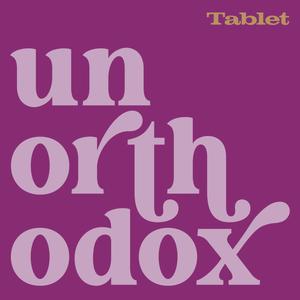 Unorthodox
Unorthodox
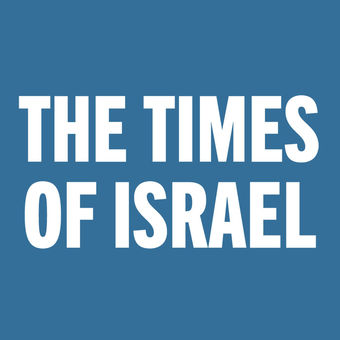 Times of Israel Podcast
Times of Israel Podcast
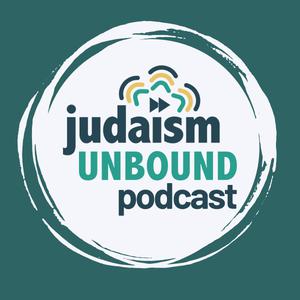 Judaism Unbound
Judaism Unbound
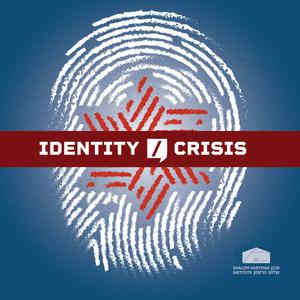 Identity/Crisis
Identity/Crisis
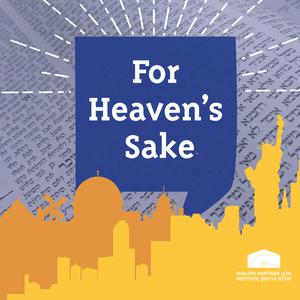 For Heaven's Sake
For Heaven's Sake
 The Tikvah Podcast
The Tikvah Podcast